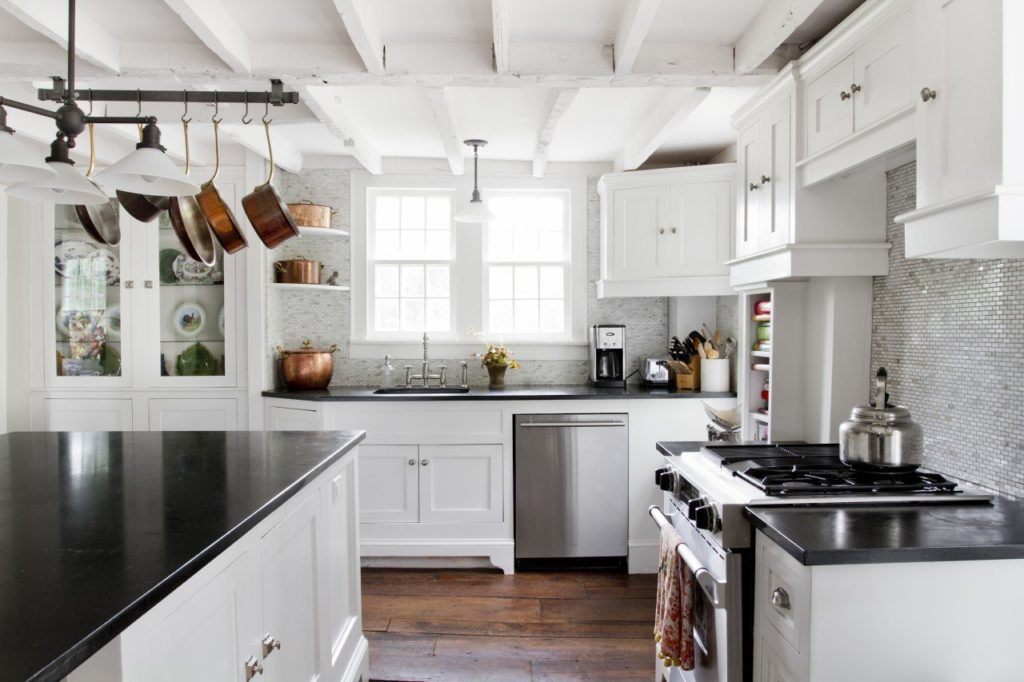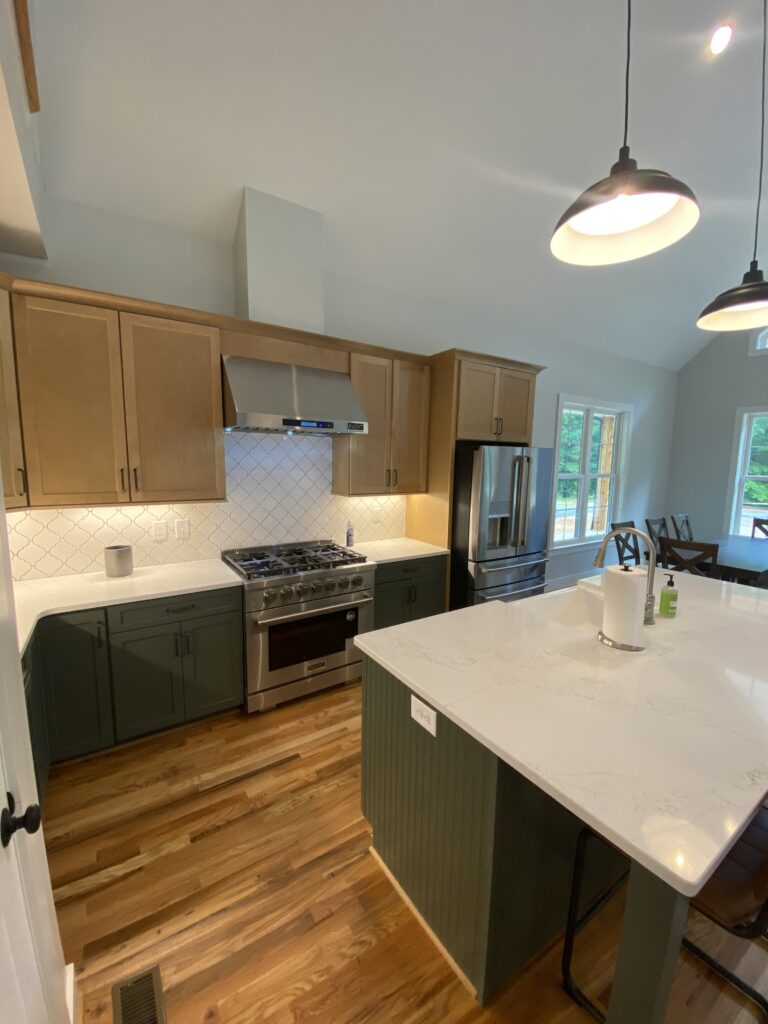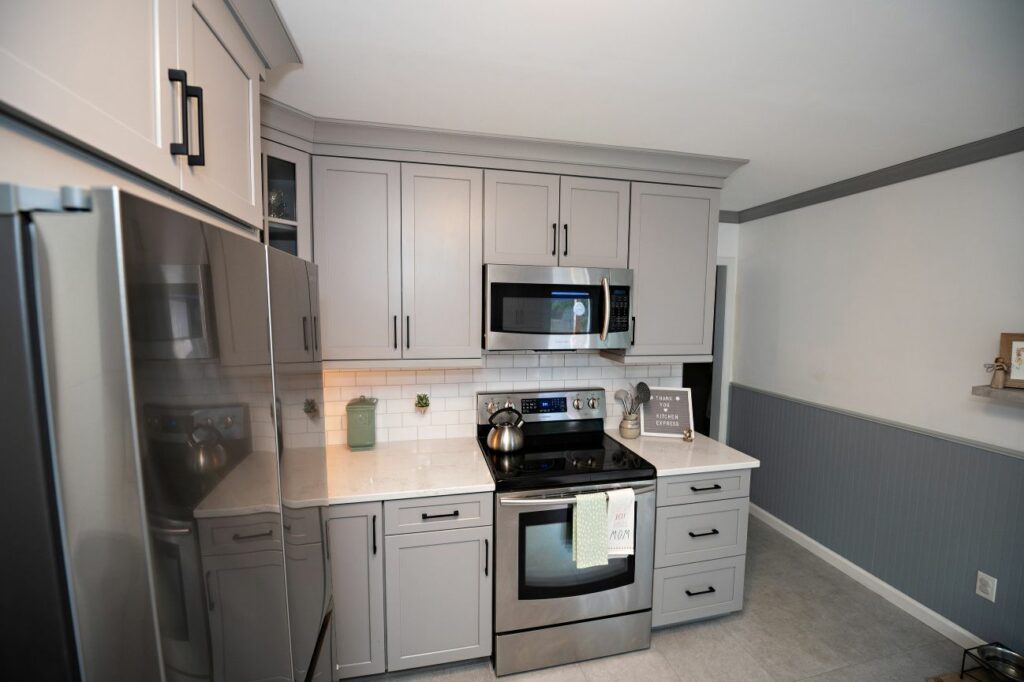When designing or remodeling a kitchen, one of the biggest decisions is how to coordinate the colors of your cabinets and walls. Should you paint your kitchen cabinets the same color as the walls, or should they be different? Let’s explore this topic and answer some common questions to help you make the best choice for your kitchen.
Should I Paint My Kitchen Cabinets the Same Color as the Walls?

Painting your kitchen cabinets the same color as the walls can create a seamless, cohesive look. This approach has both pros and cons:
- Pros:
- Unified Appearance: Matching the cabinet color to the wall color can make the kitchen look more uniform and less cluttered. It can create a sense of continuity and flow, especially in smaller spaces.
- Larger Feeling Space: Using the same color for both cabinets and walls can make a small kitchen feel larger because there are fewer contrasting elements. This is especially useful in kitchens with limited space.
- Cons:
- Less Contrast: If the cabinets and walls are the same color, it can be harder to distinguish the two elements. This might make the kitchen look flat and less dynamic.
- Maintenance Issues: If you choose a light color for both, any stains or fingerprints on the cabinets or walls might be more noticeable and harder to clean.
Using the same color for both cabinets and walls can work well in modern or minimalist designs, but it’s important to ensure that the look doesn’t become monotonous.
Should Kitchen Cabinets Be a Different Color Than Walls?

Choosing a different color for your kitchen cabinets than for your walls can create a striking contrast and add visual interest. Here are some benefits and considerations:
- Pros:
- Visual Contrast: Different colors for cabinets and walls can create a pleasing contrast that makes each element stand out. This can make the kitchen more visually interesting and give it a more dynamic appearance.
- Highlighting Features: Different colors can help highlight specific features in your kitchen, such as beautiful cabinet hardware or an attractive backsplash. It allows each element to shine and be appreciated.
- Cons:
- Risk of Clashing: If not chosen carefully, contrasting colors can clash and make the kitchen look disjointed. It’s important to pick colors that complement each other rather than compete.
- Design Complexity: Using different colors adds a layer of complexity to the design. You’ll need to ensure that the colors work well together and that the overall look remains balanced.
Choosing different colors for your cabinets and walls can be a great way to add character and style to your kitchen. It’s an opportunity to be creative and experiment with color combinations that suit your taste and home decor.
How Do You Match Kitchen Cabinets with Existing Wall Color?
If you want to coordinate your kitchen cabinets with your existing wall color, here are some tips to help you achieve a harmonious look:
- Choose Complementary Colors: Look for colors that complement each other. You can use a color wheel to find complementary shades, which are colors located opposite each other on the wheel. For example, blue and orange are complementary colors.
- Use Shades and Tones: If you want to keep a unified look but still have some variation, consider using different shades or tones of the same color. For instance, if your walls are a light blue, you could choose a darker blue for your cabinets.
- Neutral Colors: Neutral colors like white, gray, or beige are versatile and can be easily matched with various wall colors. If you have neutral walls, you can choose cabinet colors that either match or contrast subtly.
- Test Samples: Always test paint samples on both the walls and cabinets before making a final decision. Paint colors can look different depending on the lighting and the surfaces they are applied to.
Matching kitchen cabinets with existing wall color involves ensuring that the colors either complement each other or create a balanced look. By considering color harmony and testing samples, you can achieve a pleasing result.
What Colors Are the Best for Matching Kitchen Cabinets and Walls?

The best colors for matching kitchen cabinets and walls depend on the look you want to achieve and the overall style of your kitchen. Here are some popular color combinations:
- Classic White: White cabinets and walls create a timeless and clean look. This combination is especially effective in small kitchens because it reflects light and makes the space feel bigger. White can also serve as a neutral backdrop for other colors and accents.
- Gray Tones: Gray is a versatile color that works well with various shades. Light gray walls paired with darker gray cabinets create a sophisticated and modern look. Conversely, dark gray walls with lighter gray cabinets can add depth and interest.
- Beige and Cream: Beige and cream are warm, neutral colors that can make a kitchen feel cozy and inviting. These colors work well together and are suitable for traditional or rustic kitchen designs.
- Bold Contrasts: For a more dramatic look, consider using bold contrasts, such as navy blue cabinets with light gray walls. This combination adds visual interest and makes a statement.
- Soft Pastels: Soft pastel colors like mint green or pale blue can create a calming and airy feel in the kitchen. Pastels can work well together or with neutral walls for a subtle, harmonious look.
Choosing the right colors depends on your personal style and the atmosphere you want to create in your kitchen. Consider your preferences and the existing elements in your kitchen when making your decision.
Tips for Coordinating Cabinet and Wall Colors
Coordinating cabinet and wall colors can be challenging, but these tips can help you achieve a well-balanced look:
- Consider Lighting: The lighting in your kitchen can affect how colors appear. Natural light and artificial lighting can change the way colors look. Test paint samples in different lighting conditions to ensure you like the result.
- Use Color Swatches: Obtain color swatches from paint stores and place them in your kitchen to see how they look with your existing décor. This will help you visualize how the colors will work together.
- Look for Inspiration: Browse design magazines, websites, or social media for inspiration. Seeing how other people have coordinated their kitchen cabinets and walls can give you ideas and help you make decisions.
- Consult a Designer: If you’re unsure about color choices or design, consider consulting a professional interior designer. They can provide expert advice and help you select colors that will enhance your kitchen.
The Impact of Cabinet and Wall Color on Kitchen Design
The color of your kitchen cabinets and walls can significantly impact the overall design and feel of your kitchen. Here’s how:
- Creates Atmosphere: The colors you choose can set the mood for the kitchen. Soft, neutral colors create a calm and welcoming atmosphere, while bold colors can add energy and personality.
- Affects Perception of Space: Lighter colors can make a small kitchen feel larger and more open, while darker colors can create a cozy and intimate feel. The right color choices can enhance the perception of space in your kitchen.
- Highlights Design Elements: Coordinating or contrasting colors can highlight specific design elements, such as architectural details, cabinetry styles, or backsplash tiles. Color choices can help these features stand out and become focal points in your kitchen.
Conclusion
Deciding whether kitchen cabinets should match the wall color involves considering various factors, including aesthetics, functionality, and personal preference. Matching colors can create a unified and spacious look, while contrasting colors can add visual interest and highlight design elements. By choosing complementary colors, testing samples, and considering the overall design of your kitchen, you can make an informed decision that enhances the beauty and functionality of your space.
Whether you opt for matching or contrasting colors, the key is to create a cohesive and pleasing look that reflects your style and makes your kitchen a great place to cook and gather.
